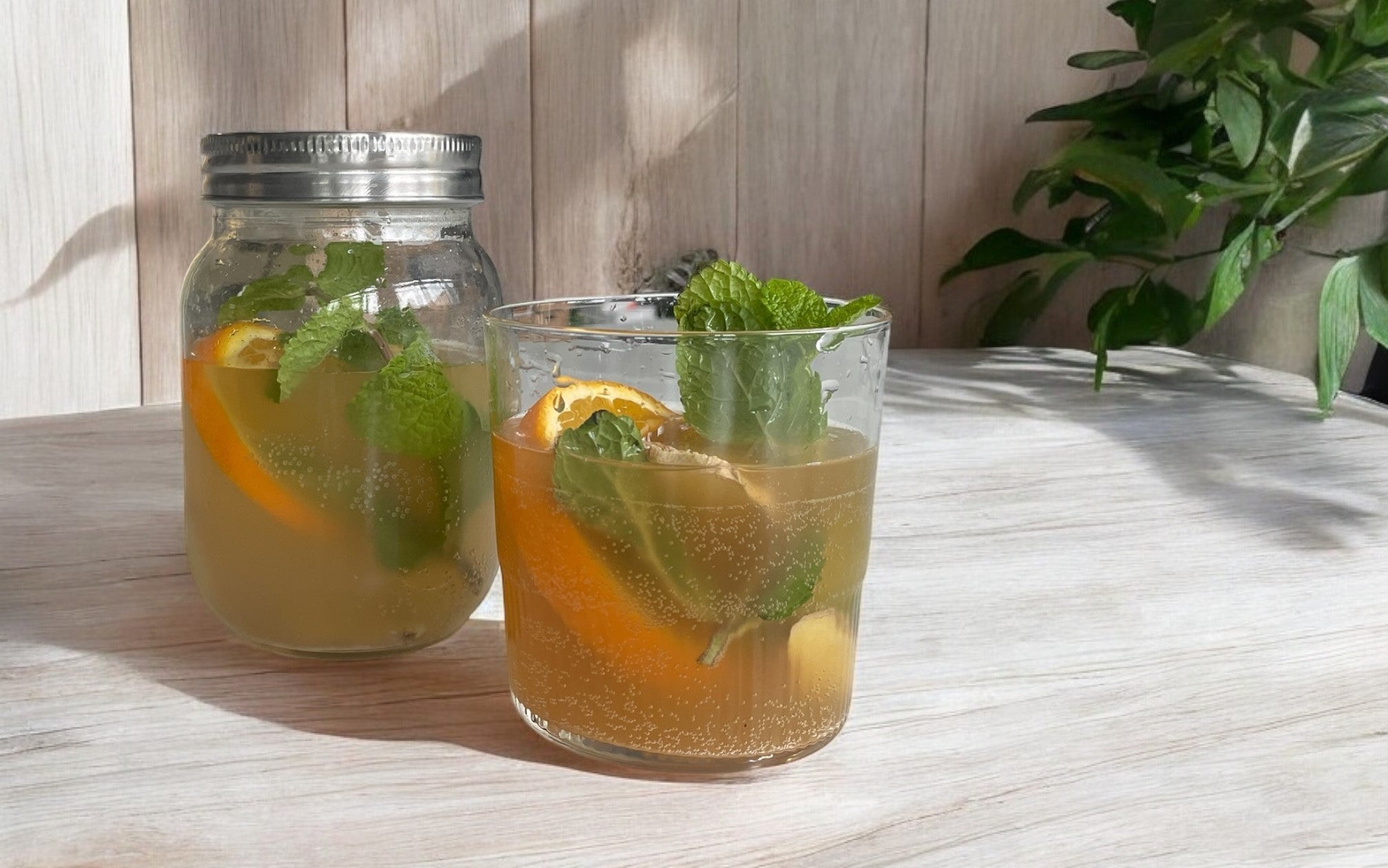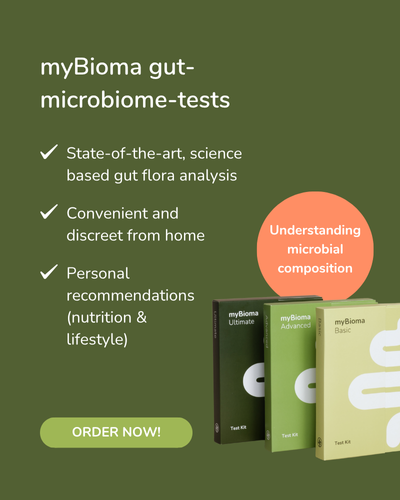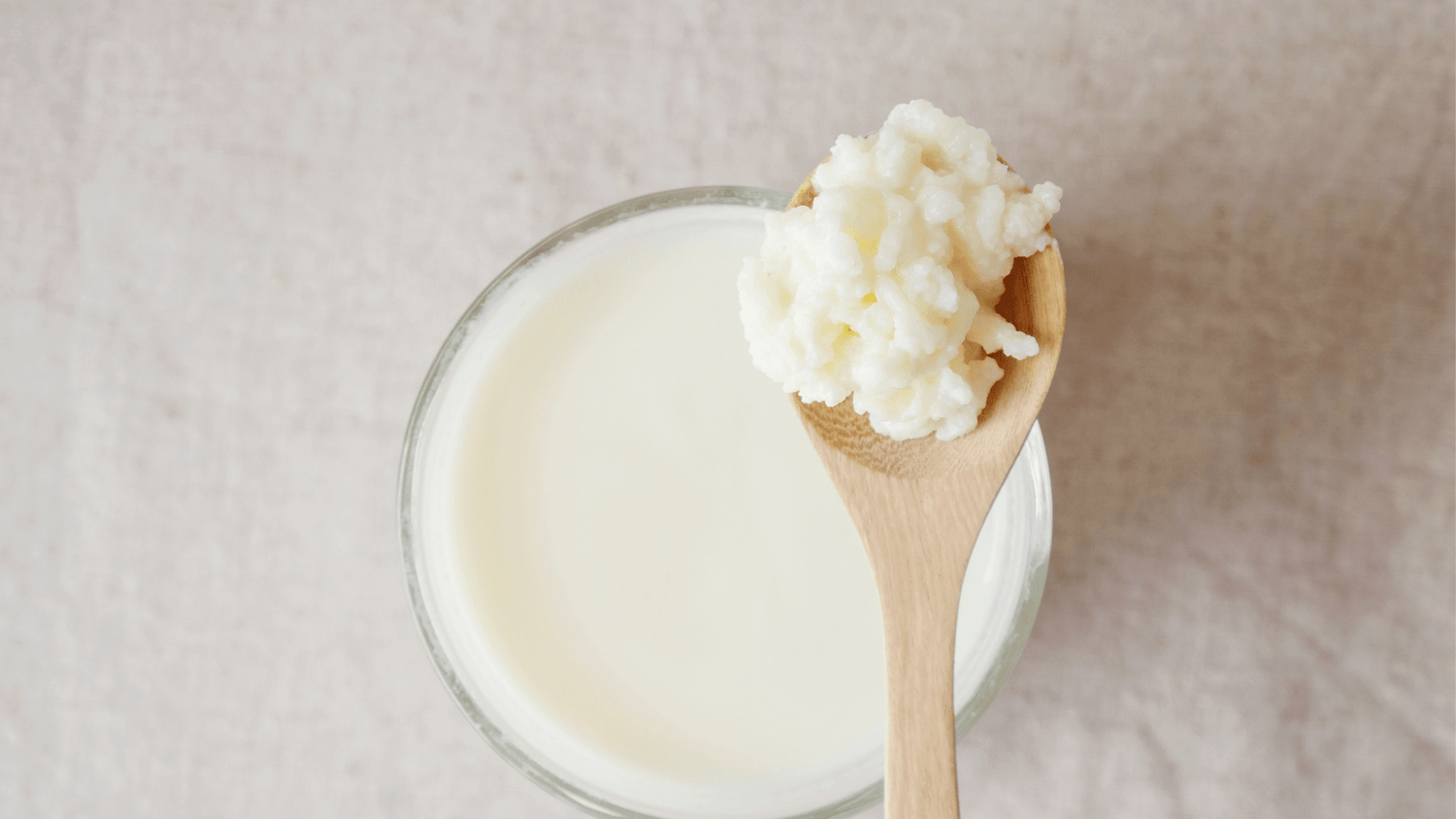Sometimes we just crave a refreshing, fizzy lemonade that tickles our taste buds and revitalizes us. But most of these drinks are sugar-laden and only offer a brief burst of energy. Today, we’re excited to introduce you to a healthy and delicious alternative: water kefir! In this blog, you'll learn everything you need to know about it and get a simple recipe to become a water kefir brewing master yourself.
What is water kefir?
Water kefir is a fizzy, fermented drink made from water kefir grains. It is rich in probiotic bacteria and yeasts that support healthy gut flora (1). While milk kefir is the more well-known variety, water kefir offers a refreshing alternative for those with severe lactose intolerance, allergies to dairy (or dairy products), or those who follow a vegan / vegetarian diet.
What are water kefir grains?
Water kefir grains, also called tibi, tibocos or Japanese crystals, are gel-like beads primarily made up of lactic acid bacteria, acetic acid bacteria and yeast. These microorganisms convert sugar into lactic acid, carbon dioxide, and trace amounts of alcohol, giving water kefir its tangy, slightly sour taste. The flavor and acidity can vary depending on the microbial community, fermentation time, and ingredients used (1).

Water kefir grains – a symbiotic blend of bacteria and yeast that turns a sugar-water solution into a probiotic beverage.
Health benefits of water kefir
The fermented drink is a great source of probiotic bacteria such as bifidobacteria and lactic acid bacteria, as well as other health-promoting substances. While the health benefits of milk kefir have been well-researched, studies on water kefir are still relatively limited. However, the following points highlight that water kefir, as a naturally vegan alternative, can easily stand on its own and serves as a gut-friendly, healthier option compared to conventional sodas.
- Probiotic drink
When consumed in sufficient quantities, probiotic bacteria offer a range of health benefits. They help maintain a healthy balance in the gut microbiome, support the immune system, have anti-inflammatory and antioxidant properties, and positively impact digestion and metabolic health (1,2). - Nutrient powerhouse
The nutrient profile of water kefir varies based on the ingredients used, the composition of the kefir grains, and the fermentation conditions (temperature and duration). It can be a rich source of probiotic bacteria, vitamins (especially B-vitamins), minerals like calcium and magnesium, organic acids, and antioxidant polyphenols (3). Generally, the longer the fermentation, the more health-boosting compounds develop. - Low-sugar refreshment
Unlike most soft drinks and lemonades, water kefir is notable for its much lower sugar content. The sugar added initially isn't for your consumption but serves as food for the bacteria and yeast. During fermentation, the microorganisms convert most of the sugar. The remaining sugar depends primarily on the fermentation time, with as little as 5% of the original sugar content left after 72 hours (4).
What do you need to make water kefir?
- Water kefir grains: These serve as the starter culture for fermentation. You can purchase them from various online retailers or find them in organic or natural food stores, as well as specialty fermentation shops.
- Sugar-water solution: Use chlorine-free, non-distilled water, as it retains essential minerals necessary for fermentation. You can choose from white sugar, brown sugar (raw cane sugar), or coconut sugar. White sugar gives the most neutral flavor, while brown or coconut sugar adds a malty note and may slightly color the kefir grains. Alternatively, you can use natural fruit juices (3).
- Dried fruits: Besides additional sugar, dried fruits provide nitrogen and minerals essential for the fermentation process. Figs are particularly beneficial due to their high calcium content (3). You can also experiment with other unsulphured, additive-free, organic dried fruits like dates, apricots, or sultanas.
- Lemon or other citrus fruits: These lower the pH level, creating an ideal environment for the kefir grains and inhibiting the growth of unwanted microbes like mold. Citrus fruits also contribute to a fresh, tangy flavor.
-
Fermentation vessel: Large glass containers, such as Mason jars, are ideal. For covering, you can use special fermentation lids, loosely close a regular lid, or cover the jar with a plate, plastic wrap, or a tea towel.
-
Sieve and funnel: A plastic or stainless steel sieve and funnel are recommended for straining the kefir grains. Avoid metals like iron, aluminum, or copper, as these can harm the kefir grains (3).
-
Fruits, herbs, and spices of your choice: These are optional for the secondary fermentation stage, allowing you to create different water kefir flavors based on your preferences or the season. Opt for organic ingredients whenever possible.
Make your own water kefir: A simple recipe
Brewing your own sparkling water kefir takes some patience, but the results are well worth it! Below is a simple, step-by-step guide to ensure your water kefir turns out perfectly. While the second fermentation is optional, it's a great opportunity to add your favorite flavors and create a unique, delicious probiotic drink.
Quantity: 750 ml
Preparation time: 8 minutes
Fermentation time: 1 to 6 days
Preparation
- Pour about 200 ml of hot water into your clean 1 liter jar and dissolve about 50-60 g of sugar in it.
- Add about 20-30 grams of dried fruits, 1-2 slices of lemon, and the juice of half a lemon, then fill with cold water until you reach approximately 750 ml.
- Let the mixture cool down and add 2-3 tablespoons of your water kefir grains.
- Close your container loosely with a regular lid or use a special fermentation lid to allow excess carbon dioxide produced during fermentation to escape safely.
- Place the jar in a warm place protected from light and let the microbes do the rest of the work. ✨
- After 24 hours, you can do a taste test to see if you like the flavor. If you prefer less sweetness, more acidity, and more carbonation, let it ferment for an additional 1-2 days, tasting it periodically to find your ideal flavor.
- Once you’re happy with the taste, strain the water kefir into glass bottles or jars using a sieve and funnel.
- Rinse the kefir grains with water, and they’re all set for your next water kefir brew. If you don’t want to start a new batch right away, store the grains in a sugar-water solution in the fridge. If your grains have multiplied significantly, you can even eat the extra ones! 😋
- At this point, you can either refrigerate and enjoy your finished kefir or, if you'd like to enhance the flavor, proceed with a second fermentation:
Second fermentation:
- Put the fruits, herbs or spices of your choice into your jars with the finished water kefir. We chose a delicious version with ginger, orange and rosemary. Close the jars and let the mixture stand at room temperature for another 1-3 days, protected from light.
- Using clean straws is a good way to do a regular taste test. Once you're satisfied with the flavor, you can enjoy your freshly made probiotic lemonade and store it in the fridge for up to 2 weeks.

Our finished water kefir after the second fermentation with orange, ginger, and mint. So tasty!
Frequently asked questions about water kefir (FAQ)
How much alcohol is in water kefir?
Similar to wine and beer production, water kefir also generates alcohol during fermentation due to yeast activity. However, the alcohol content is very low, typically less than 1%, and up to a maximum of 2% (1). The longer the fermentation, the more alcohol may form. Incidentally, similar trace amounts of alcohol are also naturally present in other foods like ripe bananas, apple juice, and orange juice.
However, during pregnancy and breastfeeding, it is advisable to avoid consuming water kefir due to its alcohol content.
How do I care for water kefir crystals?
When you make water kefir, your kefir grains grow because they feed on the sugar provided. This means you can make an almost infinite amount of water kefir - or give away any grains you don't need to friends. If you need a break from brewing, you can store the water kefir grains in a sugar-water solution in your fridge. Simply place the grains, about 2 tablespoons of sugar, and water into a small jar with a screw-top lid. This will keep them alive until you're ready to use them again. Be sure to rinse the grains and refresh the sugar-water solution once a month.
Is water kefir well tolerated?
As with most probiotic foods, your gut may need to get used to the extra bacteria. If you notice bloating or discomfort, start with a small amount (half a glass) and increase consumption slowly. If you are histamine or fructose intolerant, it is not advisable to consume water kefir. Diabetics should also be careful as some residual sugar remains after fermentation.
Can I make water kefir without sugar?
Fermentation cannot occur without sugar, as the water kefir grains rely on it for sustenance. However, most of the sugar is converted during fermentation, and the longer the process, the lower the sugar content.
How do I know if my water kefir grains are working properly?
Once fermentation begins, you'll notice small bubbles forming on the dried fruit and around the water kefir grains. These bubbles indicate that fermentation is in full swing and the process is going smoothly.
My water kefir grains look strange. What does that mean?
- If your grains become slimy, rinse them with fresh water and add more acid (like citrus fruits or lemon juice) in your next batch.
- If a white film appears on the grains, it could be kahm yeast or mold. If mold is present, both the kefir drink and grains should be discarded. Don’t get discouraged - just try again.
- If you're using brown sugar or juice, the grains might change color, but this is completely normal!
Is water kefir suitable for people with lactose intolerance?
Yes, water kefir is completely lactose-free since it’s made with water, not milk.
What is the shelf life of water kefir?
Water kefir will keep for about two weeks in the fridge. Over time, the taste may change and become slightly stronger.
What is the difference between milk kefir, water kefir and kombucha?
All three drinks are delicious, probiotic and good for your gut health. The difference lies in the ingredients and the taste:
- For water kefir you need water kefir grains, which feed on fructose (= fruit sugar, found in all types of sugar and fruits) and ferment a sugar-water solution. The result is a fizzy, sour-sweet refreshing drink.
- Milk kefir is a fermented, slightly sour milk drink that is reminiscent of drinking yoghurt or buttermilk. The special kefir grains feed on milk sugar (= lactose). You can find more information about milk kefir and a recipe in this blog post: The health benefits of kefir and how you can make it yourself.
- Kombucha is a fermented tea beverage made using a culture of bacteria and yeast known as SCOBY. This culture ferments a mixture of sugar and black or green tea, resulting in a tangy, sour-sweet flavor that varies based on the specific ingredients used. If you’re interested in learning more about kombucha, check out this interview: This is how healthy Kombucha is for your microbiome.
Why is water kefir so healthy for the gut?
Drinking water kefir regularly provides your gut with valuable probiotic bacteria that can enhance your microbiome (gut flora). A healthy gut microbiome is composed of a diverse array of bacteria that are crucial for your overall health and well-being.
Are you interested in assessing your gut health and finding ways to boost your beneficial gut bacteria? Take the myBioma microbiome test to learn more!
References
- Cufaoglu G, Erdinc AN. An alternative source of probiotics: Water kefir. Food Front. 2023;4(1):21–31.
- Lynch KM, Wilkinson S, Daenen L, Arendt EK. An update on water kefir: Microbiology, composition and production. Int J Food Microbiol. May 2021;345:109128.
- Bozkir E, Yilmaz B, Sharma H, Esatbeyoglu T, Ozogul F. Challenges in water kefir production and limitations in human consumption: A comprehensive review of current knowledge. Heliyon [Internet]. 15 July 2024 [cited 20 September 2024]; 10(13). Available at: https://www.cell.com/heliyon/abstract/S2405-8440(24)09532-X
- Laureys D, De Vuyst L. Microbial species diversity, community dynamics, and metabolite kinetics of water kefir fermentation. Appl Environ Microbiol. April 2014;80(8):2564–72.







